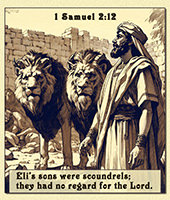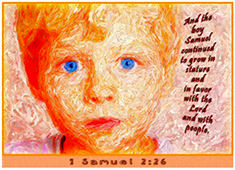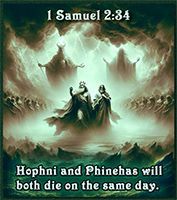1 Samuel 2:11–36 . . . Bible Study Summary with Videos and Questions
“Priest Eli’s Two Wicked Sons”
Following up on the first half of chapter 2 (see our summary that highlights 1 Sam. 1:1–2:10), we'll now see how Samuel's innocence contrasts strongly with the godlessness of Eli's sons. Samuel would succeed and become a channel of God's blessing, while Eli's sons would fail, become a source of frustration to Eli and the Israelites, and ultimately perish. Our text today sets the scene for the events in chapter 4 by contrasting the life of Samuel with the lives of Eli’s two sons, Hophni and Phinehas, sons of anarchy whom the Bible calls scoundrels (v. 12).
To fully grasp what's going on with the sons of Eli, we must know this about Levitical priests who had various duties. They were to maintain and operate the tabernacle of the Testimony. Their duties were extensive: to teach the people of Israel "The Law of Moses" and to judge them (Deuteronomy 17:8–13; 33:8–11).; any failure to do these things brought severe judgment upon them (Malachi 2:1–10).
Eli’s Wicked Sons (2:12–17)
[Note: Click the link to This Week's Passage near the bottom of this page to read today's Scripture.] Let's look closely at Eli's sons. When priests offer a sacrifice, they must first offer up to God the animal's fat. The priest making the sacrifice receives a portion of the sacrificial meat — the breast and right thigh — to be eaten with his family (see 1 Sam. 1:4–5). Such is the way the Law of Moses spells it out. But that's not the way it was done by Hophni and Phinehas. Neither man “knew the Lord” (v. 12) nor knew “the custom of the priests.”
Here's what these scoundrels did that was so wrong: First, they refused to take those portions assigned to them; they insisted on a “potluck” approach to the meat selection. When meat was boiling in the pot and someone came to offer a sacrifice, the priest would send his servant who'd use a three-pronged fork to take out whatever portion he stabbed (vv. 13–14). That portion of meat would then have been taken to the priest as his portion of the sacrificial animal.
"Where's the beef?" The priests seemed to find boiled beef too bland, wanting barbecued (or broiled) beef instead. Their servants approached those offering their sacrifices, before the meat was cooked, even before the fat was offered to God; they'd demand a prime cut of select beef for the priests. Godly Israelites, like Elkanah and Hannah, knew that the fat must first be burned on the altar. When these folks urged the priest's servant to wait at least until the fat had been burned, the servant became more forceful, demanding the priest’s meat on the spot, threatening to take it by force if necessary.
Imagine the negative impact this had had on the worship of God at Shiloh. Godly Israelites who'd make the annual trek to Shiloh to worship God at the tabernacle didn't find devout priests who'd facilitate their worship. Instead, they found priests who frustrated God's worship. Either willfully or by ignorance (ref. vv. 12 and 13), the priests functioned in a way that completely disregarded the sacred office of the Old Testament priest. Such behavior might have caused some Israelites to give up entirely on their attempt to worship at the tabernacle. In those days, there was no king in Israel; each man did what was "right in his own eyes," including the priests who were supposed to teach and judge Israel according to God’s Law.
In summary, Eli's sons served God the way they chose. The Law allowed the priests to take for themselves the breast and upper part of the right-rear leg of animals brought as peace offerings (Leviticus 7:30–34). But Eli's sons took all that the three-pronged fork brought up when plunged into the remaining meat being boiled for the sacrificial meal (vv. 13–14). Plus, the priests were to burn the best part of the sacrifices on the altar as offerings to God, but Eli's sons demanded for themselves raw meat that was not cooked (vv. 15–16). With meat being the luxurious food in Israel's economy, Eli's sons were living off the fat of the land.
God’s assessment of the priests’ conduct is given to us in v. 17: This sin of the young men was very great in the Lord’s sight, for they were treating the Lord’s offering with contempt. The priests didn't esteem the sacrifices and offerings that they offered on men’s behalf at Shiloh. This was indeed a very grave sin for the priests who led others into sin and for those who followed them. It was indeed a very sad time in Israel’s history.
The Boy Samuel (vv. 18–21)
Eli’s two sons, as leaders of the priests, behaved wickedly. However, young Samuel learned how to live a holy life, despite the fact that unholy things were constantly happening around him. Although just a boy, he worked as the servant or slave of Eli, Israel’s chief priest, who was now very old. It was Eli's responsibility to teach the boy. We don't know how much Eli understood God, however, he knew well of his duty to bless God’s people (v. 20). And he understood something about God’s standards (vv. 22–25), as well as realizing the importance of God’s Word (3:17–18) and his duties as God’s priest (4:17–18).
So Eli trained the boy; but it was God who provided young Samuel’s food. Leviticus 22:11 says that a priest’s slave was entitled to eat the sacred food, which comes from those gifts that Israel’s people give to God. So, God gave a hearty portion of these holy gifts to the priests who shared it with their close family, including their slaves.
Hannah, keeping her vow, had to leave her precious son behind at Shiloh. Each year she traveled there to worship and see her beloved son, bringing with her little garments she'd so caringly made over the previous months. Although Elkanah and Hannah had given their son to serve God, they still cared very much for him. Eli taught the boy while God provided his food; but his parents gave him his clothes. God was kind to them. Hannah had five more children. It wasn't unusual for a young boy to work as a servant or slave. However, it was unusual for a boy to work at God’s house, as Samuel did. People saw his holy behavior and his sincere attitudes, and they respected him for that (v. 26). Perhaps they hoped that, through Samuel, God would bring about a positive change in the priests' behavior. Such a change was very necessary. All God’s people were suffering because of the wicked behavior of their priests.
Eli’s Sons Adopt the Custom of Ritual Prostitution (vv. 22–26)
The sons of Eli followed the example of Canaanite worship rather than the instruction of the Mosaic Law. Even when their father confronted them with their sin, they refused to repent. Frequently old men demonstrated wisdom; sadly, Eli wasn't wise enough to restrain the sinful behavior of his sons. Josephus understood Eli's sons' immorality as follows: They were also guilty of impurity with the women that came to worship God [at the tabernacle], obliging some to submit to their lust by force, and enticing others by bribes; nay, the whole course of their lives was no better than tyranny [5:10:1].
The women referred to were evidently volunteer helpers in the service of the sanctuary. Unintentional sin was pardonable under Mosaic Law, but highhanded, deliberately rebellious sin wasn't, particularly ritual prostitution (Numbers 25:1–5; Deuteronomy 23:17; Amos 2:7–8). Punishment for highhanded sin was death (Numbers 15:30). God initially judged Eli's sons by giving them hard hearts as a result of their sin; thereafter, he brought final destruction on them.
While Eli's sons were growing in disfavor with the Lord and the Israelites (vv. 22–25), Samuel was growing in favor with both (v. 26) because he was obeying God. He continued to grow in stature and in favor with the Lord and with people.
The Oracle or Prophecy Against Eli’s House (vv. 27–36)
The rest of the chapter explains why God would put Eli's sons to death. Eli was admonished for being derelict as a father and a priest; he'd be replaced and later realize the judgment that was to fall upon his house.
The specific criticism that the man of God in v. 27 directed against Eli and his sons was two-fold: They hadn't appreciated God's grace extended to them in the Exodus deliverance; neither did they take the opportunity to serve God as his priests (vv. 27–29). It was a serious matter to undervalue God's grace. He'd initiated blessing, but they hadn't responded appropriately, namely, with gratitude, trust, and obedience. Eli's guilt (v. 29) lay in his failure to rebuke his sons severely for their sin (3:13), though he did warn them of God's judgment (v. 25). Alas, he also enjoyed the fruits of their disobedient worship (vv. 13–16). Had Eli grown fat from eating the best portions that his sons extorted from the people?
With few exceptions, the expression “man of God” suggests "prophet." In the days when “the word of the Lord was rare” (3:1), it was quite an occasion for a prophet to speak directly to men on God's behalf. In our text, an unnamed prophet came out of nowhere to rebuke Eli for his failure — indeed, his refusal — to deal decisively with his sons. In vv. 27–29, the prophet put the priesthood into its proper historical and theological perspective. He looked back into the past, to the time when the Aaronic and Levitical priesthood was established at the exodus. Then, in vv. 30–34, he looked into the future, prophesying as to the penalty that God would bring upon Eli and his house. In vv. 35 and 36, he looked forward to the nearer and more distant future, to that time when God would build a new house of priests.
Through this unnamed prophet, God challenged Eli (and us as readers) to do some original thinking. Eli’s problems, and those of his sons, were problems with the priesthood. Their solution would be a new priest (Samuel) and a new house (or dynasty) of priests. “So,” the prophet challenges us, “just how was it originally with respect to the priesthood?”
The Levitical priesthood came into being while the Israelites were still in bondage in Egypt. It was there that God designated Aaron as a priest while establishing his priestly “house.” The word “house” is repeated often here for good reason. God didn't just appoint Aaron as a priest, but appointed his sons and their sons to be in Aaron’s “house” for generations to come. So, how could Eli be fully aware of the sins that his sons committed as priests but fail to be concerned with them enough to deal adequately with his “house”? The priesthood wasn't just an individual matter, but a “house” matter. Regretfully, as Eli’s “house” continued to crumble, he did almost nothing to stop it.
Looking at v. 29, we see that Eli honored his sons more than he honored God. Apparently he was afraid to confront his sons and deal with them decisively because they might have disliked or even despised him. Being the kind of sons they were, they might have even killed him. Wanting his sons’ approval and affection more than God’s, Eli was more afraid of his sons than of his God.
Eli’s sin was exposed and explained. The blessings of the priesthood had come from God. He's the one whom Eli must honor while Eli’s sons had to be rebuked. But because of the perks that Eli enjoyed as a result of his sons' sins, and what he feared he'd lose, Eli refused to deal appropriately with their sin. God’s judgment therefore came not only upon Eli, but upon his “house.” The judgment, delivered by an unnamed prophet, pronounced upon the house of Eli in vv. 30–34, is a severe and comprehensive divine sentence that essentially revokes Eli’s priestly honor and the promises that God had given to his line, resulting in their disgrace, premature death, and destitution.
Have Eli and his sons “made themselves fat” with the sacrifices? Have they been eating only prime cuts? If so, that's about to change as we next see in the closing verse: Then everyone left in your family line will come and bow down before him for a piece of silver and a loaf of bread and plead, “Appoint me to some priestly office so I can have food to eat.” God would impoverish Eli’s “house” while allowing them to still serve as priests. He'd eliminate their “strength” and make them “weak” (v. 31). It wouldn't be a pretty sight, but all would definitely see that God would never indefinitely allow his priesthood to be defiled.
The point of our text is that Eli, as the high priest, failed to deal with his sons properly and as a judge over the nation Israel. He should have dealt with them the same way he dealt with those men and priests who were sexually immoral, who dishonored God, who profaned the priesthood, and who failed to respond to verbal correction. This one fact about Eli outweighed all others: He failed to deal rightly with his sons because they were his sons. Hannah, on the other hand, encouraged her son, Samuel, to value the service of God. Consequently, he developed into a godly man whom God and other people honored and respected (v. 26) while Eli's sons despised God and abused people (vv. 17, 22). Samuel feared God and became a great blessing to people.
† Summary of 1 Samuel 2:11–36
After Samuel is left to minister before the Lord under Eli’s supervision (2:11), the narrative contrasts Samuel’s growth in faithful service with the corrupt behavior of Eli’s sons, Hophni and Phinehas. Described as “worthless men” who didn’t know the Lord (v. 12), these priests abused their office by taking the best portions of sacrifices for themselves (vv. 13–17) and committing sexual immorality with women serving at the tabernacle (v. 22). Though Eli rebuked them, he failed to stop their wickedness (vv. 23–25). Meanwhile, God continued to bless Samuel, who grew in favor with both the Lord and the people (vv. 18, 26).
In response to the ongoing sins of Eli’s household, a “man of God” brings a prophetic message of judgment (vv. 27–36). The message recalls God’s past faithfulness to Eli’s family, but also accuses Eli of honoring his sons above God by allowing their abuses (vv. 27–29). As a result, God declares the end of the priesthood for Eli’s lineage: his descendants will no longer serve as priests, and both Hophni and Phinehas will die on the same day as a sign (vv. 30–34). God promises to raise up a faithful priest who’ll serve him truly and be established in lasting service before his “anointed one” — a reference that foreshadows Samuel and looks forward to the coming Messiah (vv. 35–36).
Key points with verse references:
• Samuel ministered faithfully before the Lord, while Eli’s sons Hophni and Phinehas were corrupt and didn’t know God (vv. 11–12, 18).
• Hophni and Phinehas abused their priestly office by stealing sacrifices and practicing immorality (vv. 13–17, 22).
• Eli rebuked his sons but failed to stop their persistent sin, and God blessed Samuel as he grew in favor (vv. 23–26).
• God sent a prophet to announce judgment on Eli’s house for honoring his sons above God (vv. 27–29).
• The prophecy foretold the removal of Eli’s family from the priesthood, the death of both sons on the same day, and God’s promise to raise up a faithful priest to serve before his anointed forever (vv. 30–36).
This Week's Passage
1 Samuel 2:11–36
New International Version (NIV) [View it in a different version by clicking here; also listen to chapter 2 narrated by Max McLean.]
† Summary Video: “The First Book of Samuel”
† Watch this introductory video clip created by BibleProject on bibleproject.com.
- Q. 1 Why does Hannah continue to make clothes for Samuel?
- Q. 2 How does Hannah and Samuel's relationship compare with Eli and his sons?



